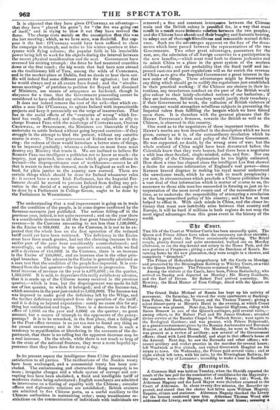In its present aspect the intelligence from China gives unmixed
satisfaction to all parties. The ratifications of the Nankin treaty have been exchanged, and a commercial treaty has been con- cluded. The embarrassing, and obstructive Hong monopoly is no more ; irregular charges and a whole system of corrupt and cor- rupting fees have been abolished, a fixed and intelligible tariff of moderate duties being substituted; English merchants are admitted to intercourse on a footing of equality with the Chinese; consular offices and diplomatic relations are established ; British cruisers are admitted to five Chinese ports, as a useful auxiliary to the Chinese authorities in maintaining order ; many troublesome re- strictions on the communication of individuals with individuals are removed ; a free and constant intercourse between the Chinese main and the British colony is provided for, in a way that must resent in a nova morel htianate relation between the two peoples ; and she Chinese have at andoned their haughty and fantastic bearing, to adopt one of thorosesigendliness and reasonable mutual defer- ence. Such are the advantages apparent on the face of the docu- ments which have passed between the representatives of the two Governments. Two other great advantages, guarantees for the rest, are, the admission of all foreign countries to a participation in the new benefits,—which must tend both to disarm jealousies and to admit China to a place in the great system of the modern civilized world ; and the probability that the fixed tariff and im- proved customs and port-regulations will so far enrich the revenue of China as to give the Imperial Government a great interest in the new order of things. These advantanges might be frustrated by any thing which should go to nullify the regulations just established in their practical working : if the Chinese are sincere in their in- tentions, any treacherous conduct on the part of the British would give colour to their lately-cherished notions of our barbarism ; if they are insincere, British treachery would justify their treachery; if their Government be weak, the collusion of British violators of the compact would strengthen rebellious subjects in preventing the Imperial rulers from fulfilling the bargain which we have forced upon them. It is therefore with the greatest pleasure that Sir HENRY POTTINGER'S firmness, towards the British as well as the Chinese, is observed in this country.
One word as to the negotiators of these important treaties. Sir HENRY'S merits are best described in the description which we have given, cursory as it is, of the extraordinary revolution which he has effected in the views and policy of the Chinese Government. He was supported, no doubt, by the strong arms of war; but the whole seabord of China might have been devastated before the Celestials knew that they were beaten, had there been a negotiator a whit less clear-headed, single-minded, calm, and firm. Nor can the ability of the Chinese diplomatists be too highly estimated. How short a time has elapsed since the intelligent LIN first showed a desire for accurate information of England's real power—since KESBEN braved disgrace in making his royal master understand the unwelcome truth, which he saw with so much perspicacity : yet now, in circumstances which preclude a Chinese politician from a vast deal of that information which is matter of course to us, the successor to those able men has succeeded in forming so just an in- terpretation of the most novel events and of the necessities of the time, as to undertake the responsibility of attempting a revolution in the long-prescribed policy of his country ; and he has at least helped to effect it. With such minds in China, and the closer in- timacy that must now inevitably arise between that country and Europe, it will be hard if millions in both regions do not reap the most signal advantages from this great event in the history of the world.


























 Previous page
Previous page